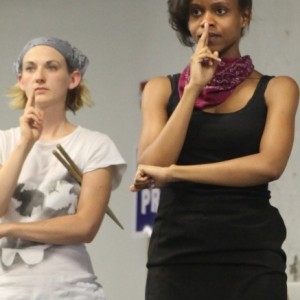
With WE ARE BANDITS, director Rebecca Wright and Applied Mechanics are working against a brutal opponent: American cynicism.
They’ve turned the third-floor space of Asian Arts Initiative into what looks like a sprawling, minimalist installation piece. Tables, chairs, and little else delineate various spaces throughout the basketball-court-sized venue, including a city square, the apartments of various characters, a rooftop, and a church.
If you’ve seen Applied Mechanics’ VAINGLORIOUS, you understand how this works. In your hand is a list of characters, a map, a schedule of events. Spread out across the space, characters begin their days. They move, interact, draw a crowd (the audience is almost always on their feet), tell their stories.
You can’t see everything. You have to choose. Scenes blend into one-another with the precision of clockwork, characters split up or come together, and stories weave together unexpectedly. It’s magical to be in the midst of it, to wander through the show and realize that no one else is having the precise experience you are. Every audience member leaves with a different story.
At its heart, WE ARE BANDITS is an ambitious exploration of the naïveté, experience, and ramifications of radicalism, idealism, and punk. Unlike VAINGLORIOUS, which told the story of Beethoven, Napoleon, and other “Notable Persons in Europe” after the French revolution, BANDITS takes place today. The characters are everyday folk: artists, office workers, students, a couple of religious zealots, etc. Through unlikely comings-together, different pockets of people exchange ideas and change one-another’s lives—at least for a while. The play builds up to a single, euphoric, almost childish event and then moves on, and we are asked to first become excited by the radical potential of action and thought, and then to absorb the reality and outcomes intellectually and emotionally.
All of the characters moonlight as doyennes of radical thought: Susan B. Anthony, Frida Kahlo, Mary Richardson, Dorothy Day and others come to life and share their ideas—either in quotations from their writings or in newly-composed, modern re-conceptions. Social philosophy student Sharon slips on a costume and is suddenly Gertrude Stein, speaking about art, music and history.
The historical figures whose work is shared, and on whose passion and intellects this play is founded, are all female—reinforcing the dramatic impact women have had on two centuries of radical thought in art, politics and philosophy. The present-day characters who drive the story are mostly women, plus a couple of homosexual men, thus turning the norm on its head.
Unfortunately, with so much going on at once—midnight drum-and-bass concerts, gay clubbing, dinner parties, and lectures on anarchy and radical humanism—it’s hard to reconcile the intellectual with the dramatic and become excited when the piece wants you to be excited.
Overstimulation like this worked for VAINGLORIOUS, which was a purely visceral experience. Audiences didn’t have to understand 19th-century Europe to enjoy Tallyrand’s plotting or Napoleon’s bloody campaigning.
What makes WE ARE BANDITS truly satisfying is that there is much more to grasp: to really be drawn through the story of WE ARE BANDITS from beginning to end, you must understand everything from the relationship between three band members, to the religious extremism of the heiress who supports them, to the intellectual basis of the concepts which inspire them to perform radical acts. What’s more, you have to toss aside your natural cynicism and be swept along with the idealists.
With everything that’s going on, climactic events go over your head, which is busy grappling with slippery abstract concepts and a spidery plot.
This said, WE ARE BANDITS is an inspired, intellectually stimulating theater piece. That alone makes it unique. It point out gaps in our understanding of the world around us and inspires us to learn more, while also providing a surprising experience of new possibilities in the medium.
What’s more, keeping with its concept of radical idea-sharing, the crowd-funded WE ARE BANDITS is absolutely free to the public, so if there’s something you don’t get, feel free to see it a second time. [Asian Arts Initiative, 1219 Vine St.] July 19-31, 2014. appliedmechanics.us.

Hi Julius,
Thank you for your thoughtful piece on the play. A correction: Doris Day is not in the piece, it’s actually Dorothy Day.
Wow! Thanks for catching that. Fixed.